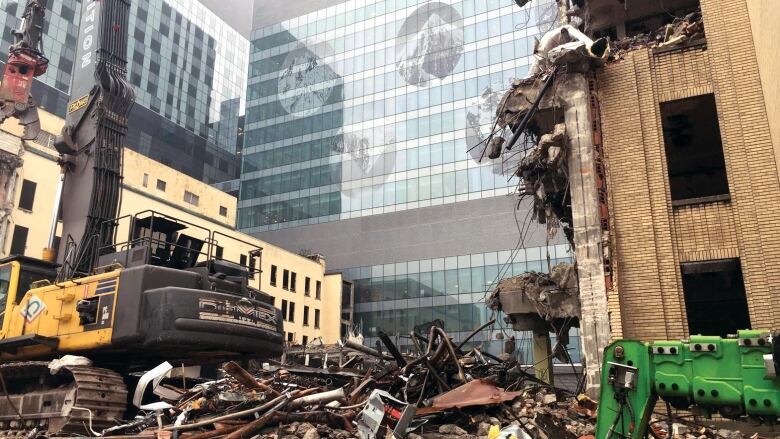As Montreal booms, construction debris is getting dumped on prime farmland
Truckloads of contaminated soil, metal and concrete dumped in countryside, Enquête investigation finds

Overlooking lettuce fields in Saint-Rémi, south of Montreal, there's an open air dump site, littered with bricks and concrete and other demolition debris.
Montreal's construction boom — new hospitals, condos, bridges and roads — means thousands of truckloads of contaminated soil, twisted rebar and concrete need to go somewhere.
And some, at least, is ending up on prime farmland, in a region renowned as Montreal's fruit and vegetable basket, Radio-Canada's investigative program Enquête has found.
Take the debris from the demolished Saint-Luc Hospital. Some of it has ended up on agricultural land belonging to A. Barbeau and sons — a Saint-Rémi vegetable producer.

Benoît Barbeau, one of the owners, said the dumping is legal, and the debris will become the foundation for a greenhouse.
Environmental lawyer Michel Bélanger disagrees.
"This is clearly a collection of debris that should be put elsewhere," Bélanger said.
Quebec's Environment Ministry has confirmed it found contaminated soil at the site last June, but it's offered no further details about its origin, saying the matter is still under investigation.
Contractors pass the buck
Pomerleau, the general contractor overseeing the construction of Montreal's French-language superhospital, the CHUM, told Enquête the subcontractor that trucked away the debris from the Saint-Luc demolition ensured it that everything was above board.
The landowner had the right to build a "farm road" with brick and stone, Pomerleau said.

However, the kind of debris found in Saint-Rémi can't legally be used for such construction, according to the Environment Ministry.
Pomerleau promised to make any necessary changes, if it turns out the subcontractor broke the rules.
Loads of soil carted off the site of the Noca condominium project site in Montreal's Griffintown neighborhood were also dumped on the Barbeau farmland.

Like Pomerleau, the Noca site manager, DevMcGill, blamed subcontractors. The law, however, is clear, said Bélanger, the environmental lawyer: the company that generates the waste is ultimately responsible for where it goes.
And the owners of agricultural land do not have the right to pollute, even if it's their land.
Tailing the trucks
Soil decontamination is a cutthroat business in southern Quebec, and it's been likened to the Wild West.
"A new player has shown up in the market who claims to be a broker in contaminated soil, Marlène Girard, president of Énergie Carboneutre, told Radio-Canada back in 2016.
"These are people who obviously do not have a licence and who do not have the technology to treat the soil."
To confirm her suspicions, Girard hired private detectives to tail debris-laden trucks from construction sites in downtown Montreal to illegal dumping grounds, she said.
"My main motivation was my business, but I did not think I'd find something that big," says Girard, who believes the illegal spread of contaminated soil poses a threat to public health and to wildlife.
"It's found in streams; it's found in the air — and it's found on our plate."
Enquête also followed trucks in the winter of 2016 and observed debris being dumped in the countryside. It sampled soil from several farms and found some samples to be contaminated, others not.
The contractors confronted by Radio-Canada all proclaimed their innocence — insisting they hadn't dumped contaminated soil and it couldn't have come from them.
Police probe comes up empty
The provincial police also investigated complaints about the illegal dumping of contaminated soil. However, after two years of work, the Sûreté du Québec came up empty-handed.
Quebec's Director of Criminal and Penal Prosecutions made the decision last spring not to lay charges.
The failure to crack down on illegal polluters deeply troubles Alain Robichaud, co-president of Englobe, a major player in soil decontamination in Quebec.
"I still do not understand why the charges were not laid in these cases," he said. "It's a catastrophe."
Like his competitor Énergie Carboneutre, Robichaud hired private detectives to follow trucks in the spring and summer of 2018.
He provided a copy of the videos to Enquête.

In addition to the dumping of Saint-Luc debris, the videos show trucks going from other worksites dumping their loads elsewhere on the South Shore, including in Ormstown and Pointe-Fortune. Radio-Canada found construction debris at those sites.
What will it take?
"I am convinced that there are still hundreds of trucks roaming around Quebec, unloading contaminated soil in unauthorized places, with impunity" said Englobe's Robichaud.
"That's the tragedy of this story: it's still happening."

The law is clear, but according to Bélanger, the Environment Ministry's rules won't be enforced unless more resources are devoted to cracking down on illegal dumping.
"If we had examples that ended up being prosecuted, eventually more landowners and entrepreneurs would do things differently," he said.
Quebec Environment Minister Benoît Charette declined Radio-Canada's request for an interview, citing investigations still underway in his department.
Translated by Benjamin Shingler and edited by Loreen Pindera

